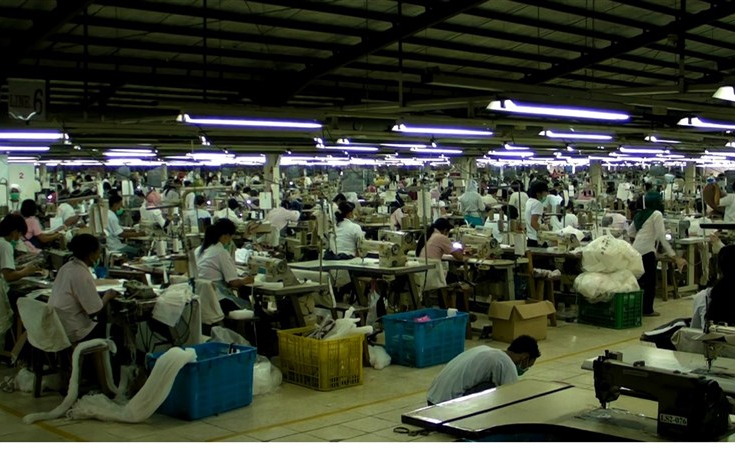A groundbreaking report by U.S.-based NGO Transparentem has uncovered serious labor rights violations in Taiwan’s textile industry, including forced labor, wage exploitation, and threats against migrant workers. The report, released in February 2024, reveals that nine Taiwanese textile suppliers serving major global brands like Adidas, Puma, Nike, H&M, and Patagonia have engaged in unethical labor practices, trapping workers in debt bondage and subjecting them to threats and wage deductions.
The investigation, which began in December 2021, involved interviews with 90 migrant workers from Indonesia, the Philippines, Thailand, and Vietnam, shedding light on the harsh realities of Taiwan’s booming textile sector.
Key Findings: Exploitation, Debt Bondage, and Forced Labor
1. Recruitment Fees and Debt Bondage
One of the most concerning findings was that all nine companies charged migrant workers recruitment fees, a practice that the Taiwanese government has banned but is still widely practiced through third-party recruiters. These fees often ranged as high as NT$90,000 (US$2,716) and were collected by recruitment agencies in the workers’ home countries.
- How the Exploitation Works: The fees are split between recruitment agents abroad and employment brokers in Taiwan, leaving workers in massive debt before they even start their jobs.
- Many workers take out loans at high-interest rates, forcing them into “debt bondage”, which is considered a form of forced labor under international labor laws.
2. Monthly Service Fees and Wage Deductions
In addition to recruitment fees, many workers had service fees deducted from their salaries, sometimes amounting to US$60 per month.
- The Taiwanese government allows service fees, but the International Labor Organization (ILO) classifies this as “withholding wages”, another indicator of forced labor.
- Many workers reported that these fees were not disclosed before they accepted the jobs, making it a case of deceptive recruitment.
3. Threats, Retaliation, and Workplace Abuses
The report also found various forms of intimidation, threats, and retaliation:
- Workers at four companies reported that they were prevented from switching employers and were threatened with deportation if they did not renew their contracts.
- Five suppliers threatened workers with legal action or forced deportation if they tried to seek better working conditions elsewhere.
- Wage deductions were used as punishments for minor infractions, such as being late or using a mobile phone during work hours.
- Some workers had their passports or identification documents confiscated, limiting their freedom.
4. Unsafe Working Conditions
Aside from financial exploitation, workers also reported unsafe working conditions, including:
- Long working hours without proper breaks.
- Lack of safety equipment when handling hazardous materials.
- Limited medical assistance despite reports of injuries.
Reactions from Brands and Authorities
1. Brands Under Pressure
After Transparentem contacted 47 global brands linked to these suppliers, many rushed to address the concerns:
- Patagonia stated that it immediately met with its suppliers and helped them develop Corrective Action Plans (CAPs). The company has pledged to eliminate recruitment fees and enforce higher labor standards.
- YKK, a major zipper manufacturer, conducted an audit of one of its suppliers, Lovetex, and found “potential abusive practices.” YKK is now working on reimbursing affected workers and ensuring future hires do not pay recruitment fees.
- Many other brands, including Nike and Adidas, have begun discussions with suppliers on how to address these violations.
However, as of February 2024, only two suppliers had reimbursed some recruitment fees, and no full repayment plans were in place.
2. Taiwanese Government Response
Taiwan’s Minister of Labor, Hung Sun-han, vowed to investigate the allegations and promised strict actions against companies found violating labor laws.
- The government has promoted online platforms where workers can check their job permits and report abuses anonymously.
- Two migrant worker service centers in Taoyuan and Changhua County have been set up to help workers switch jobs without needing brokers.
- The 1955 hotline remains open for migrant workers to report exploitation.
However, migrant rights activists remain skeptical.
3. Activists Call for Structural Reform
Lennon Wang, director of migrant worker policies at the Serve the People Association (SPA), criticized the government’s approach:
- “Migrant workers should not be paying any fees,” he stated. Instead, brands and suppliers should bear these costs, not the workers who already have fewer rights.
- Activists are demanding that Taiwan’s labor laws be reformed to eliminate brokers and middlemen, ensuring fair recruitment practices.
Long-Term Solutions Needed
This report has once again highlighted the systemic exploitation of migrant workers in Taiwan’s supply chain. While brands and the government are taking steps to address forced labor, deeper structural reforms are required, such as:
- Enforcing zero-recruitment fees and penalizing companies that allow such charges.
- Shutting down unethical brokers and introducing direct hiring policies.
- Ensuring full wage transparency before hiring workers.
- Allowing easier job transfers for workers facing exploitation.
- Stronger labor inspections and worker protection laws.
Until these changes are implemented, migrant workers in Taiwan’s textile industry will continue to be vulnerable to forced labor and exploitation.
FAQs
What is debt bondage, and why is it a problem?
Debt bondage occurs when workers are forced to work to repay debts they incurred before employment. In this case, migrant workers had to pay high recruitment fees, which left them trapped in financial burdens.
Why is the Taiwanese textile industry under scrutiny?
The Taiwanese textile industry supplies major global brands, but forced labor indicators such as wage deductions, intimidation, and recruitment fees have raised concerns about worker exploitation.
What brands are linked to the affected suppliers?
The report mentions Adidas, Puma, Nike, H&M, Patagonia, YKK, and several others as companies sourcing from Taiwanese suppliers with labor violations.
What is Taiwan’s government doing about it?
The government has promised investigations and introduced migrant worker assistance programs. However, activists argue more needs to be done to eliminate forced labor.
Are the affected workers being compensated?
As of now, only two suppliers have partially refunded recruitment fees, but comprehensive repayment plans are still lacking.


